Research Project: The Role of Transportation in Logistics, S4608958
VerifiedAdded on 2022/10/08
|29
|8542
|18
Report
AI Summary
This research project investigates the pivotal role of transportation within logistics management. The study begins by defining logistics and its significance, then explores the crucial relationship between transportation and logistics, highlighting its impact on supply chain efficiency and cost. It identifies current transport challenges faced by logistics managers, such as those related to cost, efficiency, and global supply chains. The report emphasizes the importance of strategic planning and effective risk management in mitigating these challenges, offering insights into mitigation and contingency strategies. The research utilizes a comprehensive literature review, drawing on various sources to provide a detailed understanding of the topic. The project aims to assist logistics managers and students in understanding the role of transportation in logistics and supply chain management, ultimately proposing strategies to enhance efficiency and reduce costs within the transport sector. The study also provides a background on the global impact of logistics and transportation, referencing statistics on the industry's contribution to the GDP. The report concludes with recommendations for addressing transport challenges and improving overall supply chain performance.
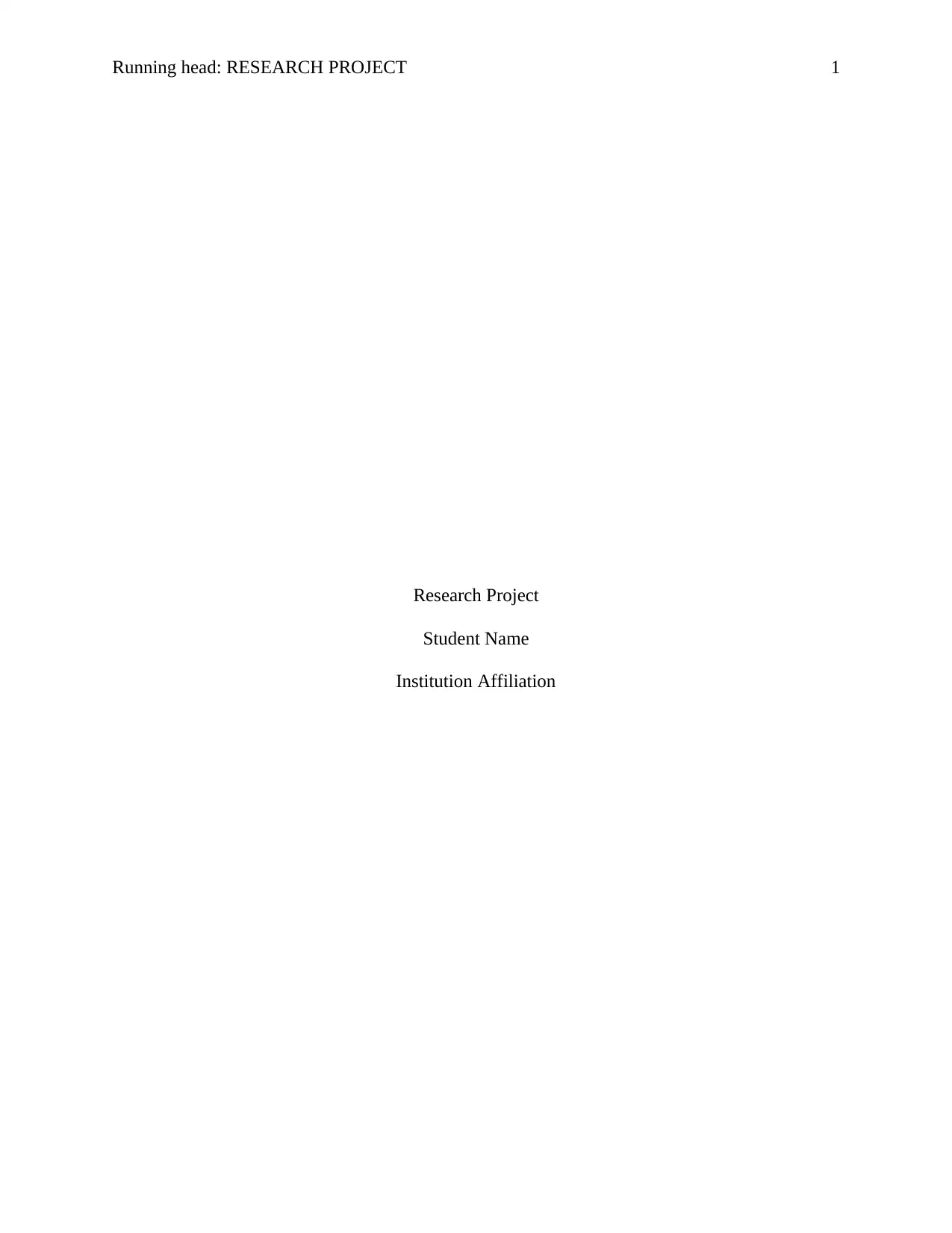
Running head: RESEARCH PROJECT 1
Research Project
Student Name
Institution Affiliation
Research Project
Student Name
Institution Affiliation
Paraphrase This Document
Need a fresh take? Get an instant paraphrase of this document with our AI Paraphraser
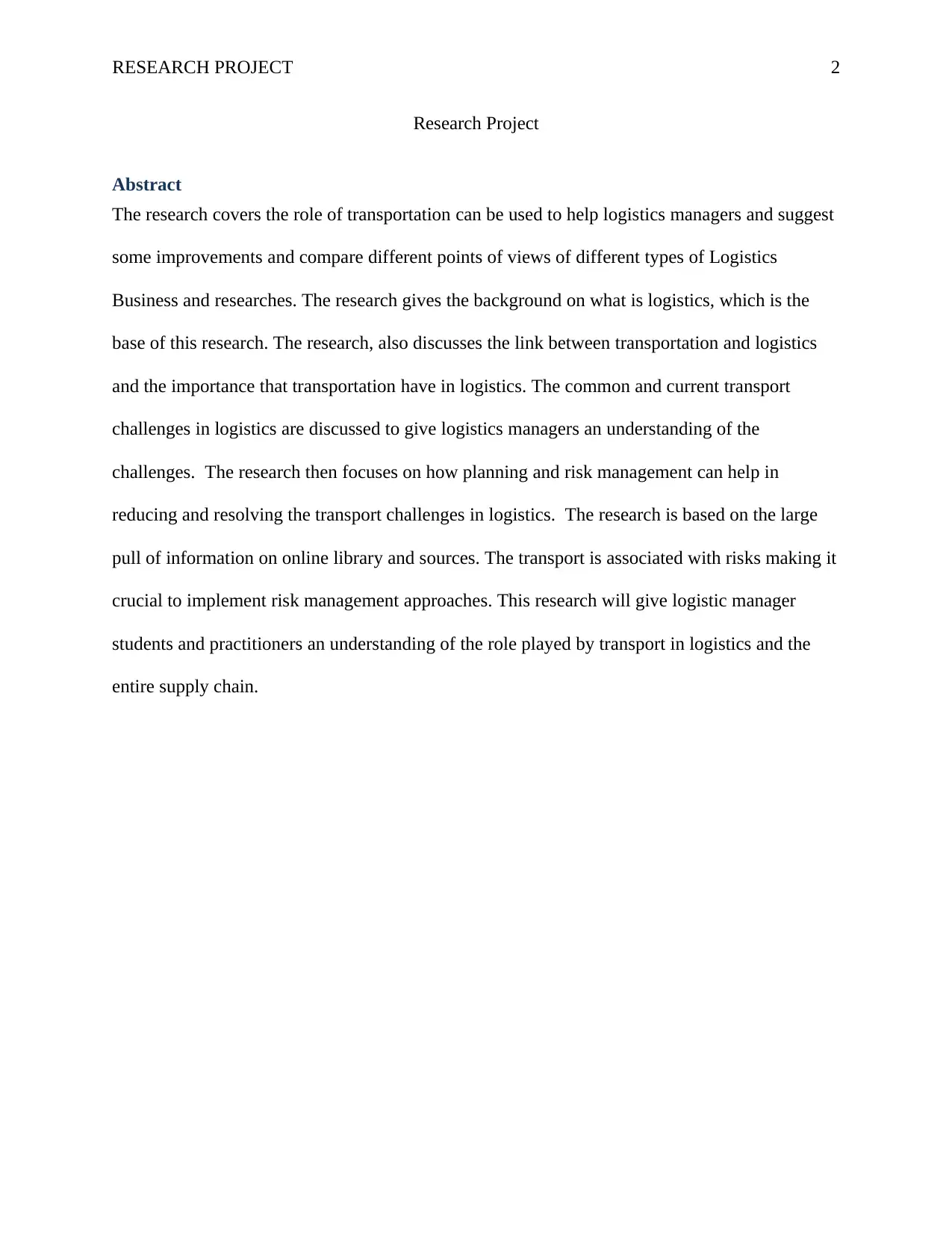
RESEARCH PROJECT 2
Research Project
Abstract
The research covers the role of transportation can be used to help logistics managers and suggest
some improvements and compare different points of views of different types of Logistics
Business and researches. The research gives the background on what is logistics, which is the
base of this research. The research, also discusses the link between transportation and logistics
and the importance that transportation have in logistics. The common and current transport
challenges in logistics are discussed to give logistics managers an understanding of the
challenges. The research then focuses on how planning and risk management can help in
reducing and resolving the transport challenges in logistics. The research is based on the large
pull of information on online library and sources. The transport is associated with risks making it
crucial to implement risk management approaches. This research will give logistic manager
students and practitioners an understanding of the role played by transport in logistics and the
entire supply chain.
Research Project
Abstract
The research covers the role of transportation can be used to help logistics managers and suggest
some improvements and compare different points of views of different types of Logistics
Business and researches. The research gives the background on what is logistics, which is the
base of this research. The research, also discusses the link between transportation and logistics
and the importance that transportation have in logistics. The common and current transport
challenges in logistics are discussed to give logistics managers an understanding of the
challenges. The research then focuses on how planning and risk management can help in
reducing and resolving the transport challenges in logistics. The research is based on the large
pull of information on online library and sources. The transport is associated with risks making it
crucial to implement risk management approaches. This research will give logistic manager
students and practitioners an understanding of the role played by transport in logistics and the
entire supply chain.
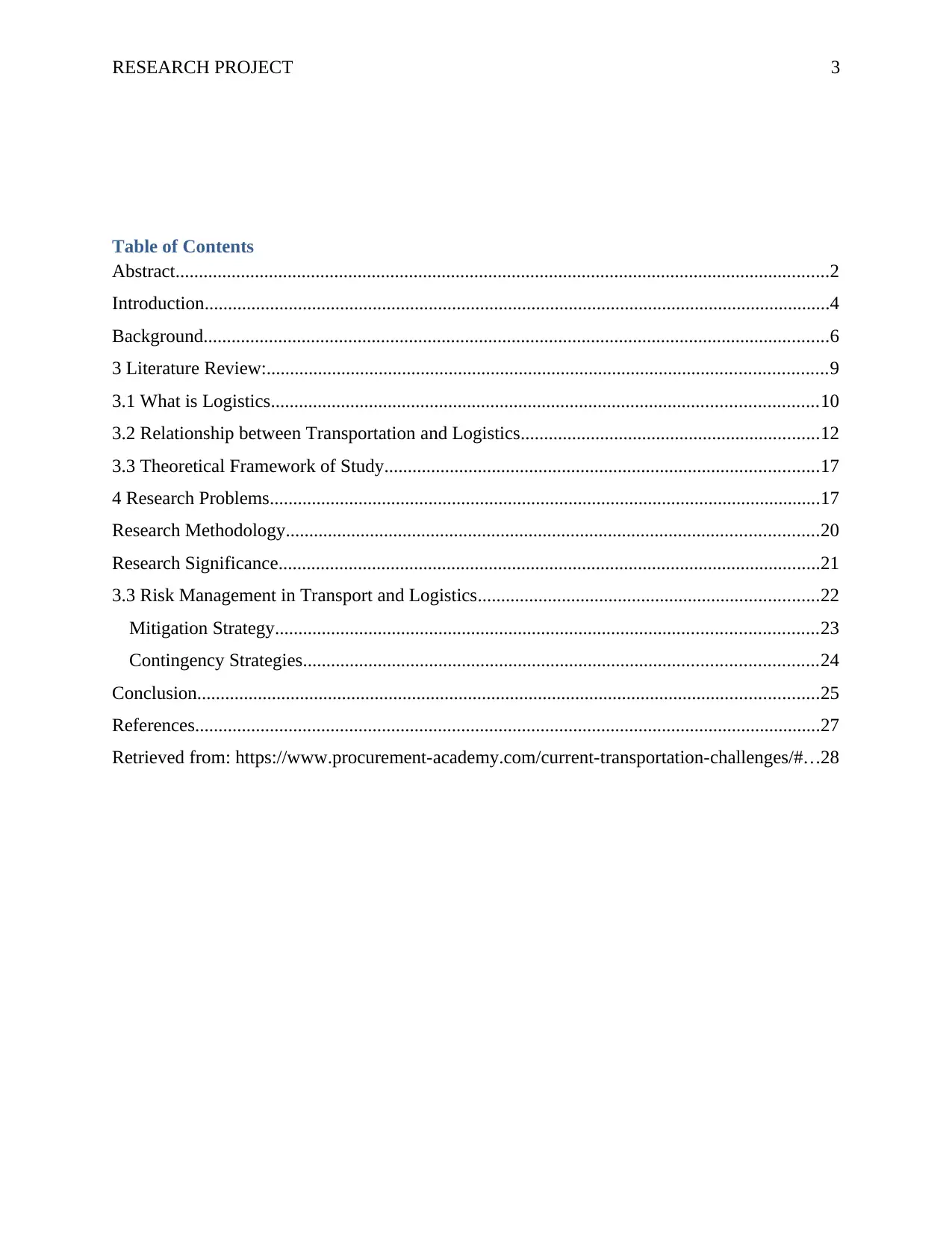
RESEARCH PROJECT 3
Table of Contents
Abstract............................................................................................................................................2
Introduction......................................................................................................................................4
Background......................................................................................................................................6
3 Literature Review:........................................................................................................................9
3.1 What is Logistics.....................................................................................................................10
3.2 Relationship between Transportation and Logistics................................................................12
3.3 Theoretical Framework of Study.............................................................................................17
4 Research Problems......................................................................................................................17
Research Methodology..................................................................................................................20
Research Significance....................................................................................................................21
3.3 Risk Management in Transport and Logistics.........................................................................22
Mitigation Strategy....................................................................................................................23
Contingency Strategies..............................................................................................................24
Conclusion.....................................................................................................................................25
References......................................................................................................................................27
Retrieved from: https://www.procurement-academy.com/current-transportation-challenges/#...28
Table of Contents
Abstract............................................................................................................................................2
Introduction......................................................................................................................................4
Background......................................................................................................................................6
3 Literature Review:........................................................................................................................9
3.1 What is Logistics.....................................................................................................................10
3.2 Relationship between Transportation and Logistics................................................................12
3.3 Theoretical Framework of Study.............................................................................................17
4 Research Problems......................................................................................................................17
Research Methodology..................................................................................................................20
Research Significance....................................................................................................................21
3.3 Risk Management in Transport and Logistics.........................................................................22
Mitigation Strategy....................................................................................................................23
Contingency Strategies..............................................................................................................24
Conclusion.....................................................................................................................................25
References......................................................................................................................................27
Retrieved from: https://www.procurement-academy.com/current-transportation-challenges/#...28
⊘ This is a preview!⊘
Do you want full access?
Subscribe today to unlock all pages.

Trusted by 1+ million students worldwide
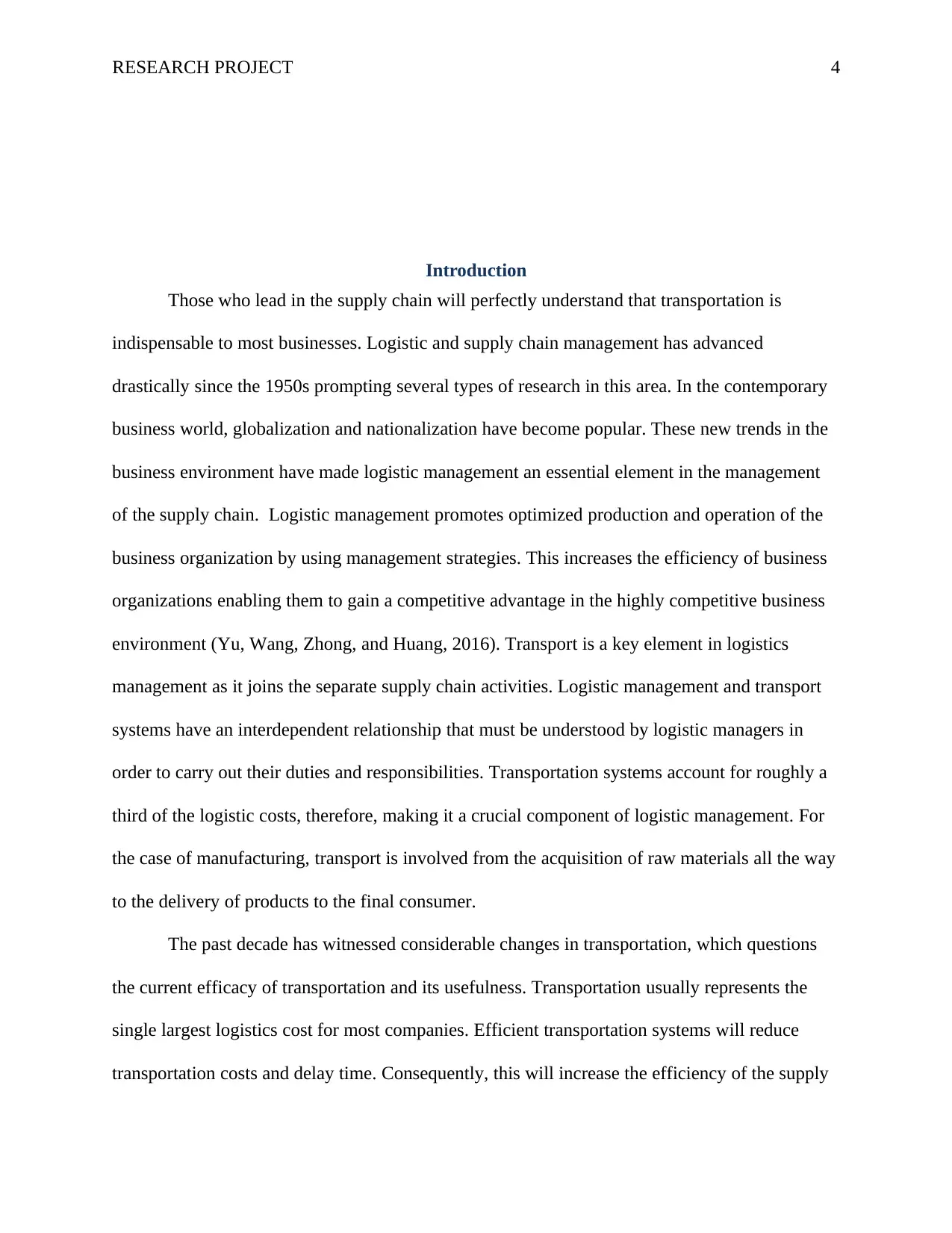
RESEARCH PROJECT 4
Introduction
Those who lead in the supply chain will perfectly understand that transportation is
indispensable to most businesses. Logistic and supply chain management has advanced
drastically since the 1950s prompting several types of research in this area. In the contemporary
business world, globalization and nationalization have become popular. These new trends in the
business environment have made logistic management an essential element in the management
of the supply chain. Logistic management promotes optimized production and operation of the
business organization by using management strategies. This increases the efficiency of business
organizations enabling them to gain a competitive advantage in the highly competitive business
environment (Yu, Wang, Zhong, and Huang, 2016). Transport is a key element in logistics
management as it joins the separate supply chain activities. Logistic management and transport
systems have an interdependent relationship that must be understood by logistic managers in
order to carry out their duties and responsibilities. Transportation systems account for roughly a
third of the logistic costs, therefore, making it a crucial component of logistic management. For
the case of manufacturing, transport is involved from the acquisition of raw materials all the way
to the delivery of products to the final consumer.
The past decade has witnessed considerable changes in transportation, which questions
the current efficacy of transportation and its usefulness. Transportation usually represents the
single largest logistics cost for most companies. Efficient transportation systems will reduce
transportation costs and delay time. Consequently, this will increase the efficiency of the supply
Introduction
Those who lead in the supply chain will perfectly understand that transportation is
indispensable to most businesses. Logistic and supply chain management has advanced
drastically since the 1950s prompting several types of research in this area. In the contemporary
business world, globalization and nationalization have become popular. These new trends in the
business environment have made logistic management an essential element in the management
of the supply chain. Logistic management promotes optimized production and operation of the
business organization by using management strategies. This increases the efficiency of business
organizations enabling them to gain a competitive advantage in the highly competitive business
environment (Yu, Wang, Zhong, and Huang, 2016). Transport is a key element in logistics
management as it joins the separate supply chain activities. Logistic management and transport
systems have an interdependent relationship that must be understood by logistic managers in
order to carry out their duties and responsibilities. Transportation systems account for roughly a
third of the logistic costs, therefore, making it a crucial component of logistic management. For
the case of manufacturing, transport is involved from the acquisition of raw materials all the way
to the delivery of products to the final consumer.
The past decade has witnessed considerable changes in transportation, which questions
the current efficacy of transportation and its usefulness. Transportation usually represents the
single largest logistics cost for most companies. Efficient transportation systems will reduce
transportation costs and delay time. Consequently, this will increase the efficiency of the supply
Paraphrase This Document
Need a fresh take? Get an instant paraphrase of this document with our AI Paraphraser
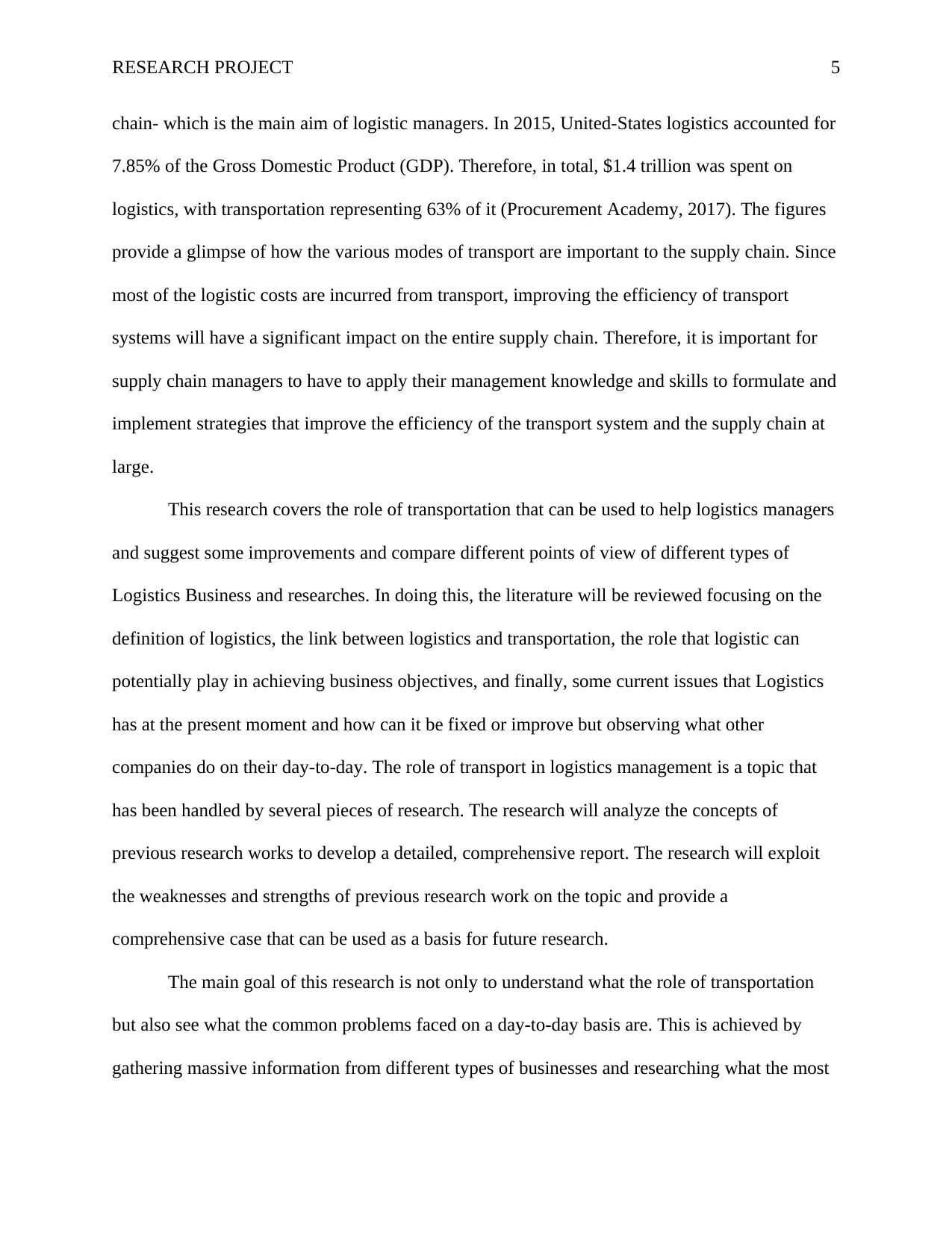
RESEARCH PROJECT 5
chain- which is the main aim of logistic managers. In 2015, United-States logistics accounted for
7.85% of the Gross Domestic Product (GDP). Therefore, in total, $1.4 trillion was spent on
logistics, with transportation representing 63% of it (Procurement Academy, 2017). The figures
provide a glimpse of how the various modes of transport are important to the supply chain. Since
most of the logistic costs are incurred from transport, improving the efficiency of transport
systems will have a significant impact on the entire supply chain. Therefore, it is important for
supply chain managers to have to apply their management knowledge and skills to formulate and
implement strategies that improve the efficiency of the transport system and the supply chain at
large.
This research covers the role of transportation that can be used to help logistics managers
and suggest some improvements and compare different points of view of different types of
Logistics Business and researches. In doing this, the literature will be reviewed focusing on the
definition of logistics, the link between logistics and transportation, the role that logistic can
potentially play in achieving business objectives, and finally, some current issues that Logistics
has at the present moment and how can it be fixed or improve but observing what other
companies do on their day-to-day. The role of transport in logistics management is a topic that
has been handled by several pieces of research. The research will analyze the concepts of
previous research works to develop a detailed, comprehensive report. The research will exploit
the weaknesses and strengths of previous research work on the topic and provide a
comprehensive case that can be used as a basis for future research.
The main goal of this research is not only to understand what the role of transportation
but also see what the common problems faced on a day-to-day basis are. This is achieved by
gathering massive information from different types of businesses and researching what the most
chain- which is the main aim of logistic managers. In 2015, United-States logistics accounted for
7.85% of the Gross Domestic Product (GDP). Therefore, in total, $1.4 trillion was spent on
logistics, with transportation representing 63% of it (Procurement Academy, 2017). The figures
provide a glimpse of how the various modes of transport are important to the supply chain. Since
most of the logistic costs are incurred from transport, improving the efficiency of transport
systems will have a significant impact on the entire supply chain. Therefore, it is important for
supply chain managers to have to apply their management knowledge and skills to formulate and
implement strategies that improve the efficiency of the transport system and the supply chain at
large.
This research covers the role of transportation that can be used to help logistics managers
and suggest some improvements and compare different points of view of different types of
Logistics Business and researches. In doing this, the literature will be reviewed focusing on the
definition of logistics, the link between logistics and transportation, the role that logistic can
potentially play in achieving business objectives, and finally, some current issues that Logistics
has at the present moment and how can it be fixed or improve but observing what other
companies do on their day-to-day. The role of transport in logistics management is a topic that
has been handled by several pieces of research. The research will analyze the concepts of
previous research works to develop a detailed, comprehensive report. The research will exploit
the weaknesses and strengths of previous research work on the topic and provide a
comprehensive case that can be used as a basis for future research.
The main goal of this research is not only to understand what the role of transportation
but also see what the common problems faced on a day-to-day basis are. This is achieved by
gathering massive information from different types of businesses and researching what the most
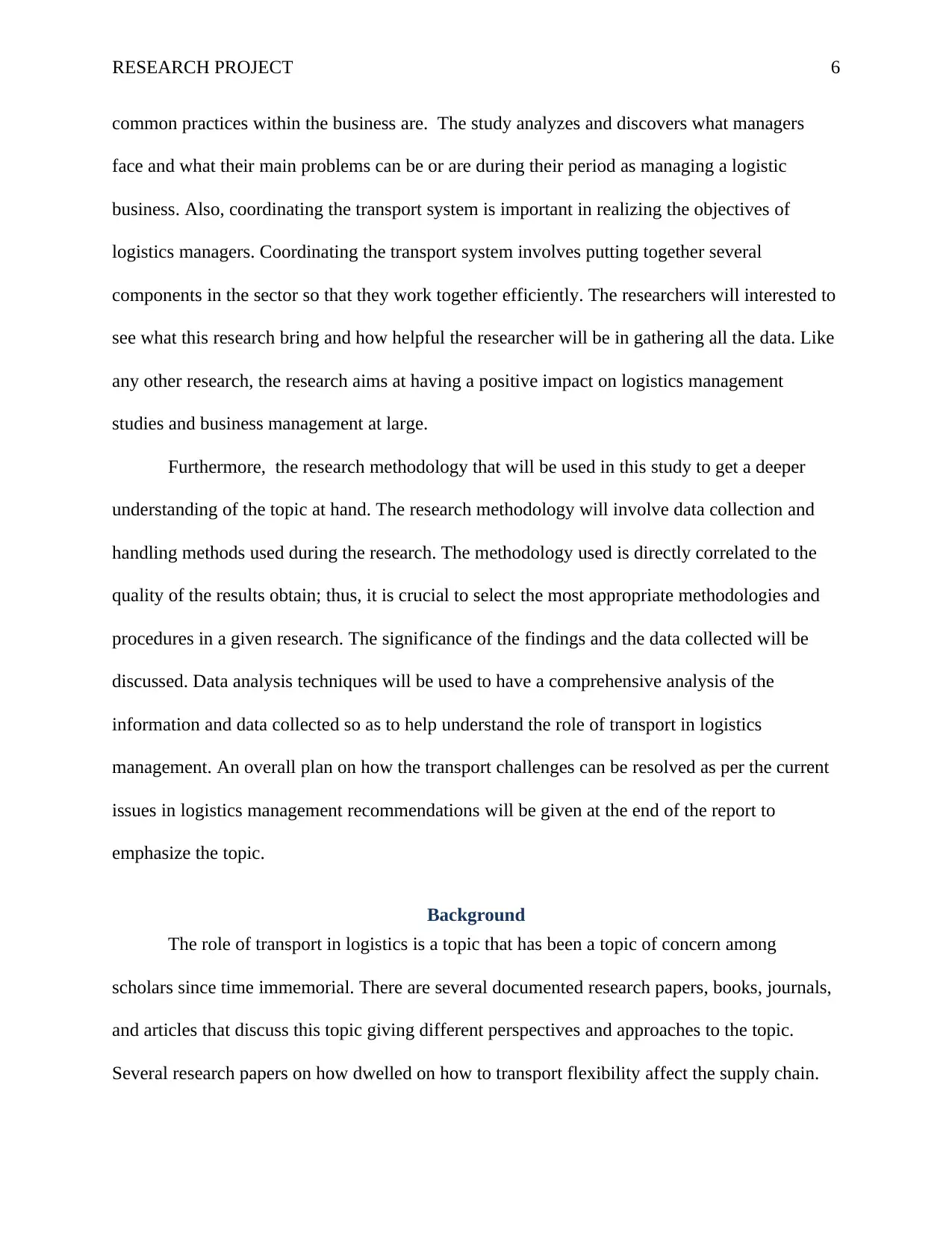
RESEARCH PROJECT 6
common practices within the business are. The study analyzes and discovers what managers
face and what their main problems can be or are during their period as managing a logistic
business. Also, coordinating the transport system is important in realizing the objectives of
logistics managers. Coordinating the transport system involves putting together several
components in the sector so that they work together efficiently. The researchers will interested to
see what this research bring and how helpful the researcher will be in gathering all the data. Like
any other research, the research aims at having a positive impact on logistics management
studies and business management at large.
Furthermore, the research methodology that will be used in this study to get a deeper
understanding of the topic at hand. The research methodology will involve data collection and
handling methods used during the research. The methodology used is directly correlated to the
quality of the results obtain; thus, it is crucial to select the most appropriate methodologies and
procedures in a given research. The significance of the findings and the data collected will be
discussed. Data analysis techniques will be used to have a comprehensive analysis of the
information and data collected so as to help understand the role of transport in logistics
management. An overall plan on how the transport challenges can be resolved as per the current
issues in logistics management recommendations will be given at the end of the report to
emphasize the topic.
Background
The role of transport in logistics is a topic that has been a topic of concern among
scholars since time immemorial. There are several documented research papers, books, journals,
and articles that discuss this topic giving different perspectives and approaches to the topic.
Several research papers on how dwelled on how to transport flexibility affect the supply chain.
common practices within the business are. The study analyzes and discovers what managers
face and what their main problems can be or are during their period as managing a logistic
business. Also, coordinating the transport system is important in realizing the objectives of
logistics managers. Coordinating the transport system involves putting together several
components in the sector so that they work together efficiently. The researchers will interested to
see what this research bring and how helpful the researcher will be in gathering all the data. Like
any other research, the research aims at having a positive impact on logistics management
studies and business management at large.
Furthermore, the research methodology that will be used in this study to get a deeper
understanding of the topic at hand. The research methodology will involve data collection and
handling methods used during the research. The methodology used is directly correlated to the
quality of the results obtain; thus, it is crucial to select the most appropriate methodologies and
procedures in a given research. The significance of the findings and the data collected will be
discussed. Data analysis techniques will be used to have a comprehensive analysis of the
information and data collected so as to help understand the role of transport in logistics
management. An overall plan on how the transport challenges can be resolved as per the current
issues in logistics management recommendations will be given at the end of the report to
emphasize the topic.
Background
The role of transport in logistics is a topic that has been a topic of concern among
scholars since time immemorial. There are several documented research papers, books, journals,
and articles that discuss this topic giving different perspectives and approaches to the topic.
Several research papers on how dwelled on how to transport flexibility affect the supply chain.
⊘ This is a preview!⊘
Do you want full access?
Subscribe today to unlock all pages.

Trusted by 1+ million students worldwide
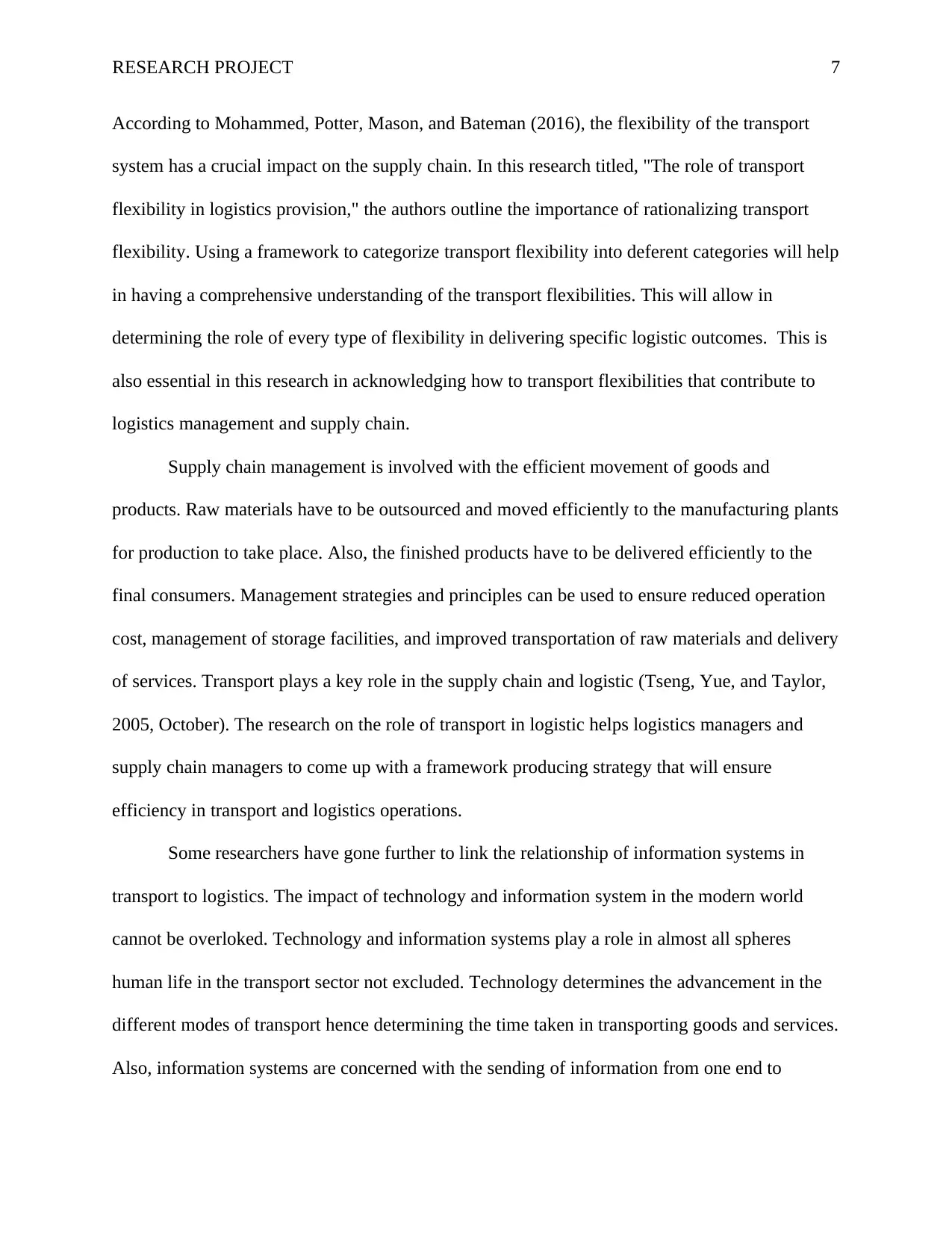
RESEARCH PROJECT 7
According to Mohammed, Potter, Mason, and Bateman (2016), the flexibility of the transport
system has a crucial impact on the supply chain. In this research titled, "The role of transport
flexibility in logistics provision," the authors outline the importance of rationalizing transport
flexibility. Using a framework to categorize transport flexibility into deferent categories will help
in having a comprehensive understanding of the transport flexibilities. This will allow in
determining the role of every type of flexibility in delivering specific logistic outcomes. This is
also essential in this research in acknowledging how to transport flexibilities that contribute to
logistics management and supply chain.
Supply chain management is involved with the efficient movement of goods and
products. Raw materials have to be outsourced and moved efficiently to the manufacturing plants
for production to take place. Also, the finished products have to be delivered efficiently to the
final consumers. Management strategies and principles can be used to ensure reduced operation
cost, management of storage facilities, and improved transportation of raw materials and delivery
of services. Transport plays a key role in the supply chain and logistic (Tseng, Yue, and Taylor,
2005, October). The research on the role of transport in logistic helps logistics managers and
supply chain managers to come up with a framework producing strategy that will ensure
efficiency in transport and logistics operations.
Some researchers have gone further to link the relationship of information systems in
transport to logistics. The impact of technology and information system in the modern world
cannot be overloked. Technology and information systems play a role in almost all spheres
human life in the transport sector not excluded. Technology determines the advancement in the
different modes of transport hence determining the time taken in transporting goods and services.
Also, information systems are concerned with the sending of information from one end to
According to Mohammed, Potter, Mason, and Bateman (2016), the flexibility of the transport
system has a crucial impact on the supply chain. In this research titled, "The role of transport
flexibility in logistics provision," the authors outline the importance of rationalizing transport
flexibility. Using a framework to categorize transport flexibility into deferent categories will help
in having a comprehensive understanding of the transport flexibilities. This will allow in
determining the role of every type of flexibility in delivering specific logistic outcomes. This is
also essential in this research in acknowledging how to transport flexibilities that contribute to
logistics management and supply chain.
Supply chain management is involved with the efficient movement of goods and
products. Raw materials have to be outsourced and moved efficiently to the manufacturing plants
for production to take place. Also, the finished products have to be delivered efficiently to the
final consumers. Management strategies and principles can be used to ensure reduced operation
cost, management of storage facilities, and improved transportation of raw materials and delivery
of services. Transport plays a key role in the supply chain and logistic (Tseng, Yue, and Taylor,
2005, October). The research on the role of transport in logistic helps logistics managers and
supply chain managers to come up with a framework producing strategy that will ensure
efficiency in transport and logistics operations.
Some researchers have gone further to link the relationship of information systems in
transport to logistics. The impact of technology and information system in the modern world
cannot be overloked. Technology and information systems play a role in almost all spheres
human life in the transport sector not excluded. Technology determines the advancement in the
different modes of transport hence determining the time taken in transporting goods and services.
Also, information systems are concerned with the sending of information from one end to
Paraphrase This Document
Need a fresh take? Get an instant paraphrase of this document with our AI Paraphraser
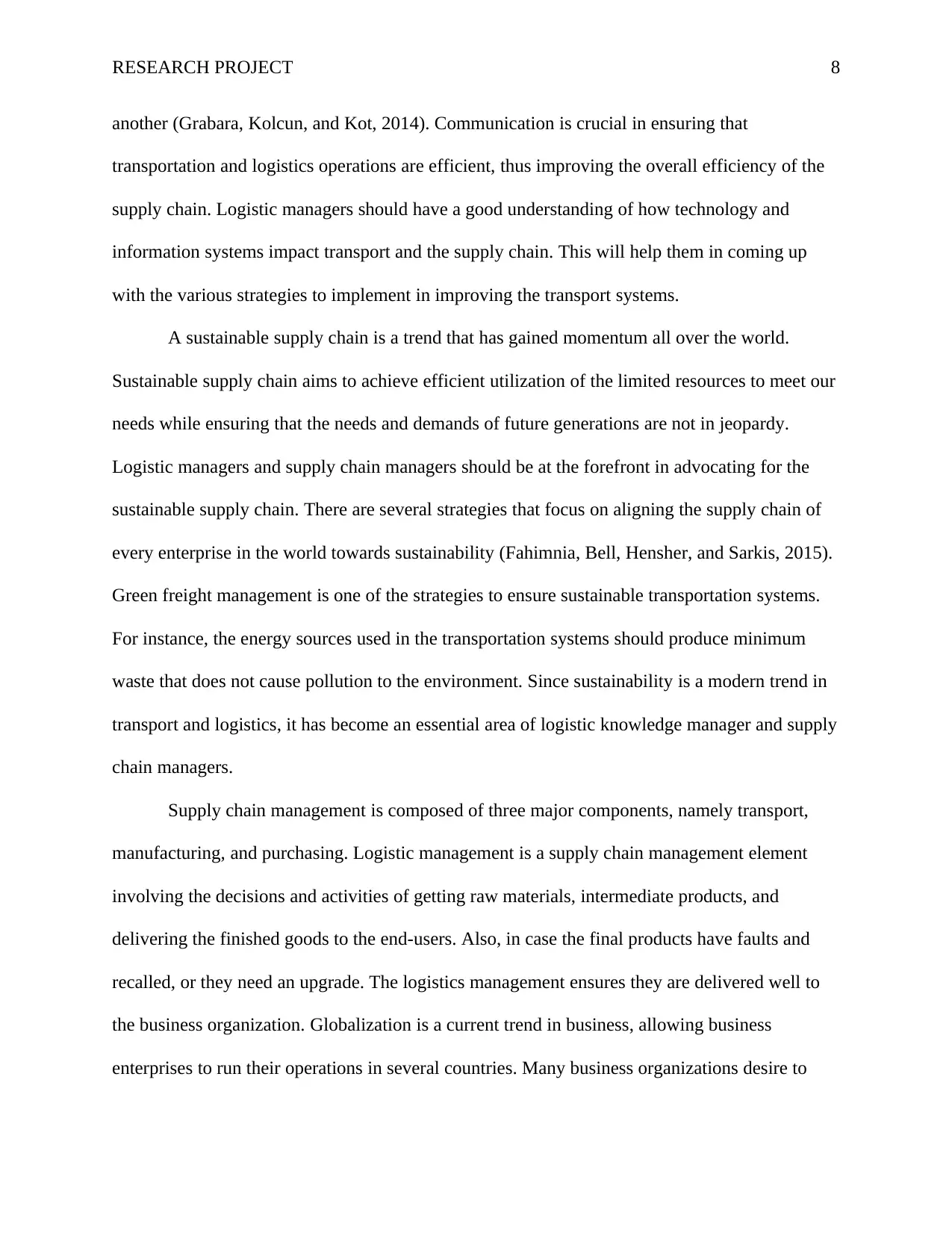
RESEARCH PROJECT 8
another (Grabara, Kolcun, and Kot, 2014). Communication is crucial in ensuring that
transportation and logistics operations are efficient, thus improving the overall efficiency of the
supply chain. Logistic managers should have a good understanding of how technology and
information systems impact transport and the supply chain. This will help them in coming up
with the various strategies to implement in improving the transport systems.
A sustainable supply chain is a trend that has gained momentum all over the world.
Sustainable supply chain aims to achieve efficient utilization of the limited resources to meet our
needs while ensuring that the needs and demands of future generations are not in jeopardy.
Logistic managers and supply chain managers should be at the forefront in advocating for the
sustainable supply chain. There are several strategies that focus on aligning the supply chain of
every enterprise in the world towards sustainability (Fahimnia, Bell, Hensher, and Sarkis, 2015).
Green freight management is one of the strategies to ensure sustainable transportation systems.
For instance, the energy sources used in the transportation systems should produce minimum
waste that does not cause pollution to the environment. Since sustainability is a modern trend in
transport and logistics, it has become an essential area of logistic knowledge manager and supply
chain managers.
Supply chain management is composed of three major components, namely transport,
manufacturing, and purchasing. Logistic management is a supply chain management element
involving the decisions and activities of getting raw materials, intermediate products, and
delivering the finished goods to the end-users. Also, in case the final products have faults and
recalled, or they need an upgrade. The logistics management ensures they are delivered well to
the business organization. Globalization is a current trend in business, allowing business
enterprises to run their operations in several countries. Many business organizations desire to
another (Grabara, Kolcun, and Kot, 2014). Communication is crucial in ensuring that
transportation and logistics operations are efficient, thus improving the overall efficiency of the
supply chain. Logistic managers should have a good understanding of how technology and
information systems impact transport and the supply chain. This will help them in coming up
with the various strategies to implement in improving the transport systems.
A sustainable supply chain is a trend that has gained momentum all over the world.
Sustainable supply chain aims to achieve efficient utilization of the limited resources to meet our
needs while ensuring that the needs and demands of future generations are not in jeopardy.
Logistic managers and supply chain managers should be at the forefront in advocating for the
sustainable supply chain. There are several strategies that focus on aligning the supply chain of
every enterprise in the world towards sustainability (Fahimnia, Bell, Hensher, and Sarkis, 2015).
Green freight management is one of the strategies to ensure sustainable transportation systems.
For instance, the energy sources used in the transportation systems should produce minimum
waste that does not cause pollution to the environment. Since sustainability is a modern trend in
transport and logistics, it has become an essential area of logistic knowledge manager and supply
chain managers.
Supply chain management is composed of three major components, namely transport,
manufacturing, and purchasing. Logistic management is a supply chain management element
involving the decisions and activities of getting raw materials, intermediate products, and
delivering the finished goods to the end-users. Also, in case the final products have faults and
recalled, or they need an upgrade. The logistics management ensures they are delivered well to
the business organization. Globalization is a current trend in business, allowing business
enterprises to run their operations in several countries. Many business organizations desire to
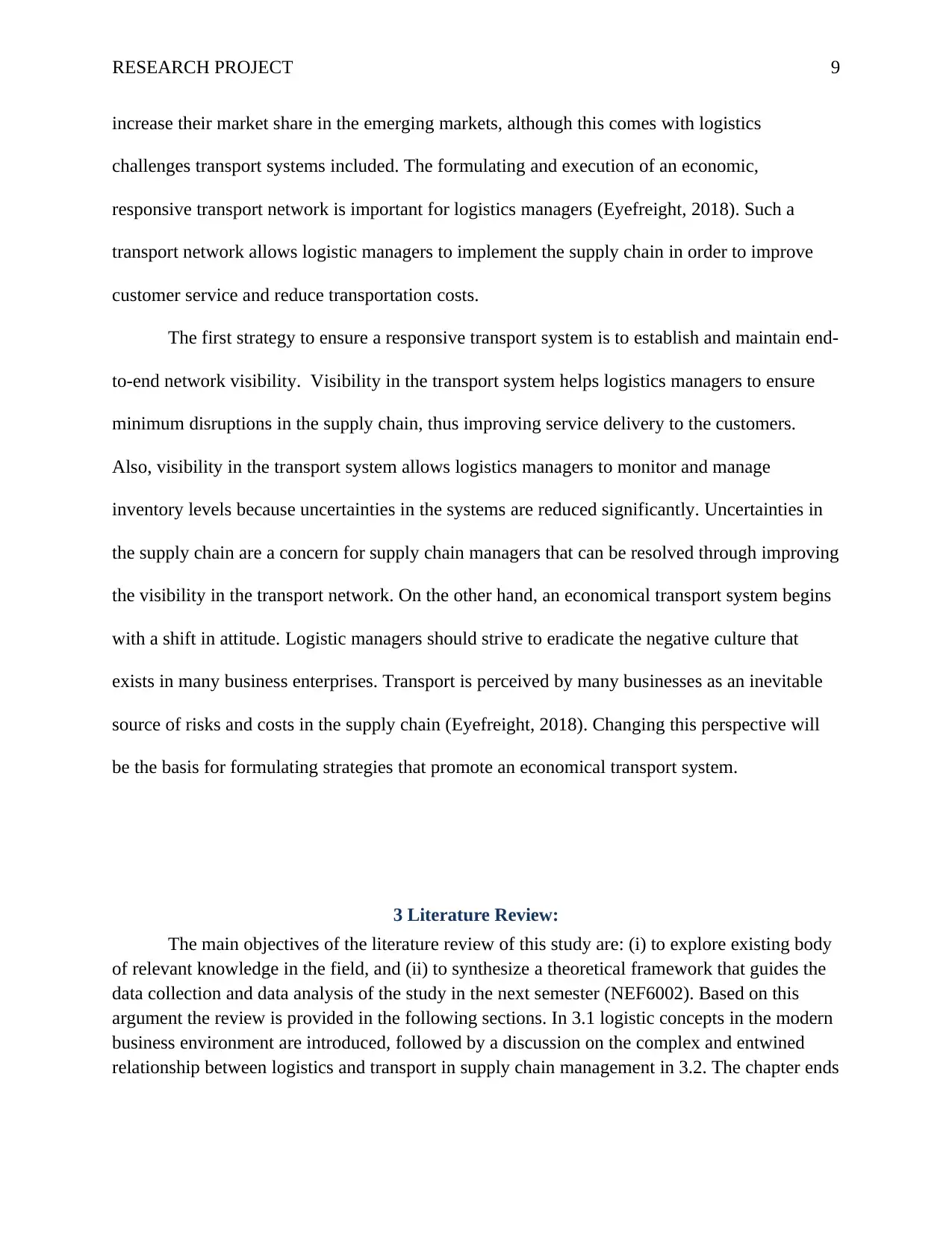
RESEARCH PROJECT 9
increase their market share in the emerging markets, although this comes with logistics
challenges transport systems included. The formulating and execution of an economic,
responsive transport network is important for logistics managers (Eyefreight, 2018). Such a
transport network allows logistic managers to implement the supply chain in order to improve
customer service and reduce transportation costs.
The first strategy to ensure a responsive transport system is to establish and maintain end-
to-end network visibility. Visibility in the transport system helps logistics managers to ensure
minimum disruptions in the supply chain, thus improving service delivery to the customers.
Also, visibility in the transport system allows logistics managers to monitor and manage
inventory levels because uncertainties in the systems are reduced significantly. Uncertainties in
the supply chain are a concern for supply chain managers that can be resolved through improving
the visibility in the transport network. On the other hand, an economical transport system begins
with a shift in attitude. Logistic managers should strive to eradicate the negative culture that
exists in many business enterprises. Transport is perceived by many businesses as an inevitable
source of risks and costs in the supply chain (Eyefreight, 2018). Changing this perspective will
be the basis for formulating strategies that promote an economical transport system.
3 Literature Review:
The main objectives of the literature review of this study are: (i) to explore existing body
of relevant knowledge in the field, and (ii) to synthesize a theoretical framework that guides the
data collection and data analysis of the study in the next semester (NEF6002). Based on this
argument the review is provided in the following sections. In 3.1 logistic concepts in the modern
business environment are introduced, followed by a discussion on the complex and entwined
relationship between logistics and transport in supply chain management in 3.2. The chapter ends
increase their market share in the emerging markets, although this comes with logistics
challenges transport systems included. The formulating and execution of an economic,
responsive transport network is important for logistics managers (Eyefreight, 2018). Such a
transport network allows logistic managers to implement the supply chain in order to improve
customer service and reduce transportation costs.
The first strategy to ensure a responsive transport system is to establish and maintain end-
to-end network visibility. Visibility in the transport system helps logistics managers to ensure
minimum disruptions in the supply chain, thus improving service delivery to the customers.
Also, visibility in the transport system allows logistics managers to monitor and manage
inventory levels because uncertainties in the systems are reduced significantly. Uncertainties in
the supply chain are a concern for supply chain managers that can be resolved through improving
the visibility in the transport network. On the other hand, an economical transport system begins
with a shift in attitude. Logistic managers should strive to eradicate the negative culture that
exists in many business enterprises. Transport is perceived by many businesses as an inevitable
source of risks and costs in the supply chain (Eyefreight, 2018). Changing this perspective will
be the basis for formulating strategies that promote an economical transport system.
3 Literature Review:
The main objectives of the literature review of this study are: (i) to explore existing body
of relevant knowledge in the field, and (ii) to synthesize a theoretical framework that guides the
data collection and data analysis of the study in the next semester (NEF6002). Based on this
argument the review is provided in the following sections. In 3.1 logistic concepts in the modern
business environment are introduced, followed by a discussion on the complex and entwined
relationship between logistics and transport in supply chain management in 3.2. The chapter ends
⊘ This is a preview!⊘
Do you want full access?
Subscribe today to unlock all pages.

Trusted by 1+ million students worldwide
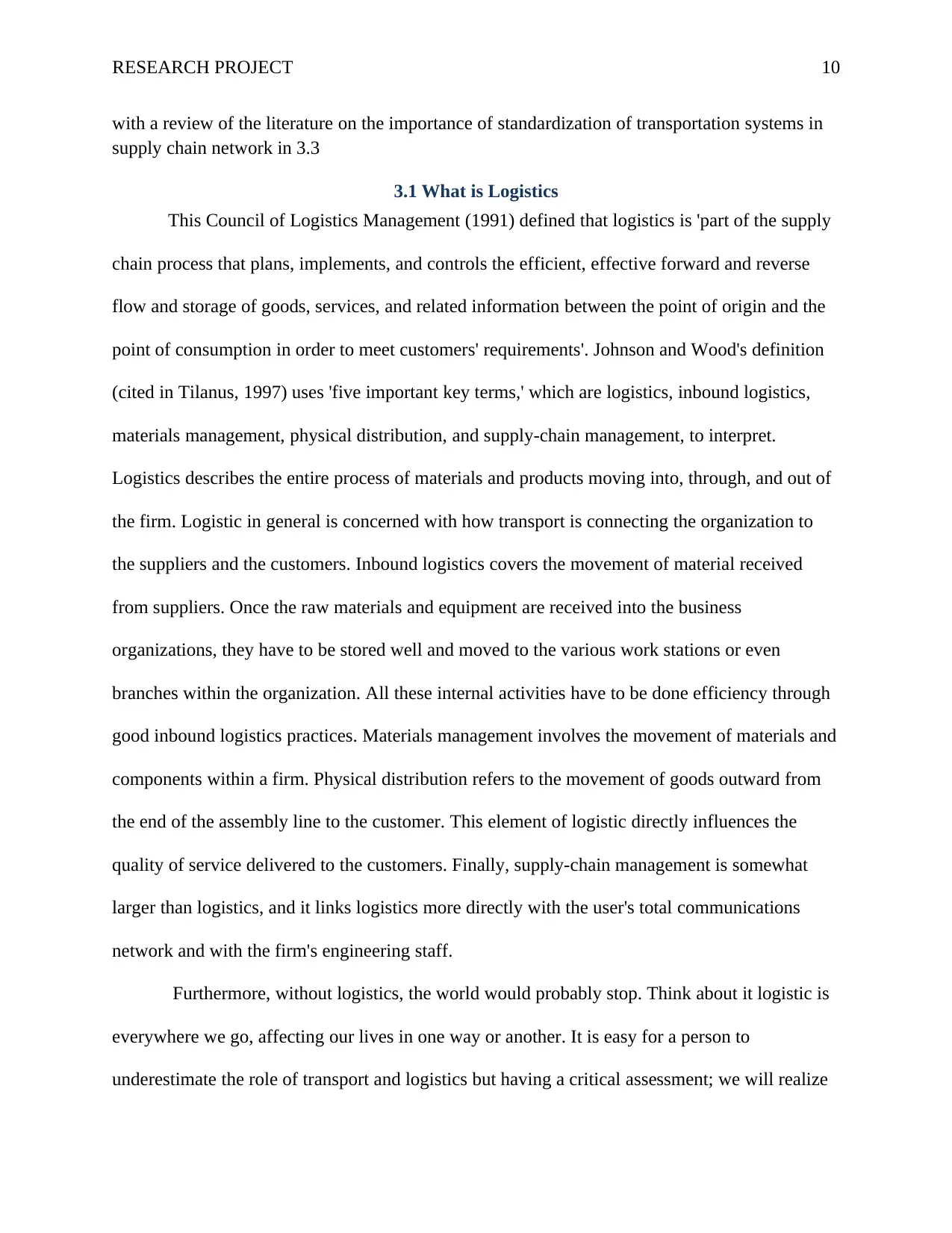
RESEARCH PROJECT 10
with a review of the literature on the importance of standardization of transportation systems in
supply chain network in 3.3
3.1 What is Logistics
This Council of Logistics Management (1991) defined that logistics is 'part of the supply
chain process that plans, implements, and controls the efficient, effective forward and reverse
flow and storage of goods, services, and related information between the point of origin and the
point of consumption in order to meet customers' requirements'. Johnson and Wood's definition
(cited in Tilanus, 1997) uses 'five important key terms,' which are logistics, inbound logistics,
materials management, physical distribution, and supply-chain management, to interpret.
Logistics describes the entire process of materials and products moving into, through, and out of
the firm. Logistic in general is concerned with how transport is connecting the organization to
the suppliers and the customers. Inbound logistics covers the movement of material received
from suppliers. Once the raw materials and equipment are received into the business
organizations, they have to be stored well and moved to the various work stations or even
branches within the organization. All these internal activities have to be done efficiency through
good inbound logistics practices. Materials management involves the movement of materials and
components within a firm. Physical distribution refers to the movement of goods outward from
the end of the assembly line to the customer. This element of logistic directly influences the
quality of service delivered to the customers. Finally, supply-chain management is somewhat
larger than logistics, and it links logistics more directly with the user's total communications
network and with the firm's engineering staff.
Furthermore, without logistics, the world would probably stop. Think about it logistic is
everywhere we go, affecting our lives in one way or another. It is easy for a person to
underestimate the role of transport and logistics but having a critical assessment; we will realize
with a review of the literature on the importance of standardization of transportation systems in
supply chain network in 3.3
3.1 What is Logistics
This Council of Logistics Management (1991) defined that logistics is 'part of the supply
chain process that plans, implements, and controls the efficient, effective forward and reverse
flow and storage of goods, services, and related information between the point of origin and the
point of consumption in order to meet customers' requirements'. Johnson and Wood's definition
(cited in Tilanus, 1997) uses 'five important key terms,' which are logistics, inbound logistics,
materials management, physical distribution, and supply-chain management, to interpret.
Logistics describes the entire process of materials and products moving into, through, and out of
the firm. Logistic in general is concerned with how transport is connecting the organization to
the suppliers and the customers. Inbound logistics covers the movement of material received
from suppliers. Once the raw materials and equipment are received into the business
organizations, they have to be stored well and moved to the various work stations or even
branches within the organization. All these internal activities have to be done efficiency through
good inbound logistics practices. Materials management involves the movement of materials and
components within a firm. Physical distribution refers to the movement of goods outward from
the end of the assembly line to the customer. This element of logistic directly influences the
quality of service delivered to the customers. Finally, supply-chain management is somewhat
larger than logistics, and it links logistics more directly with the user's total communications
network and with the firm's engineering staff.
Furthermore, without logistics, the world would probably stop. Think about it logistic is
everywhere we go, affecting our lives in one way or another. It is easy for a person to
underestimate the role of transport and logistics but having a critical assessment; we will realize
Paraphrase This Document
Need a fresh take? Get an instant paraphrase of this document with our AI Paraphraser
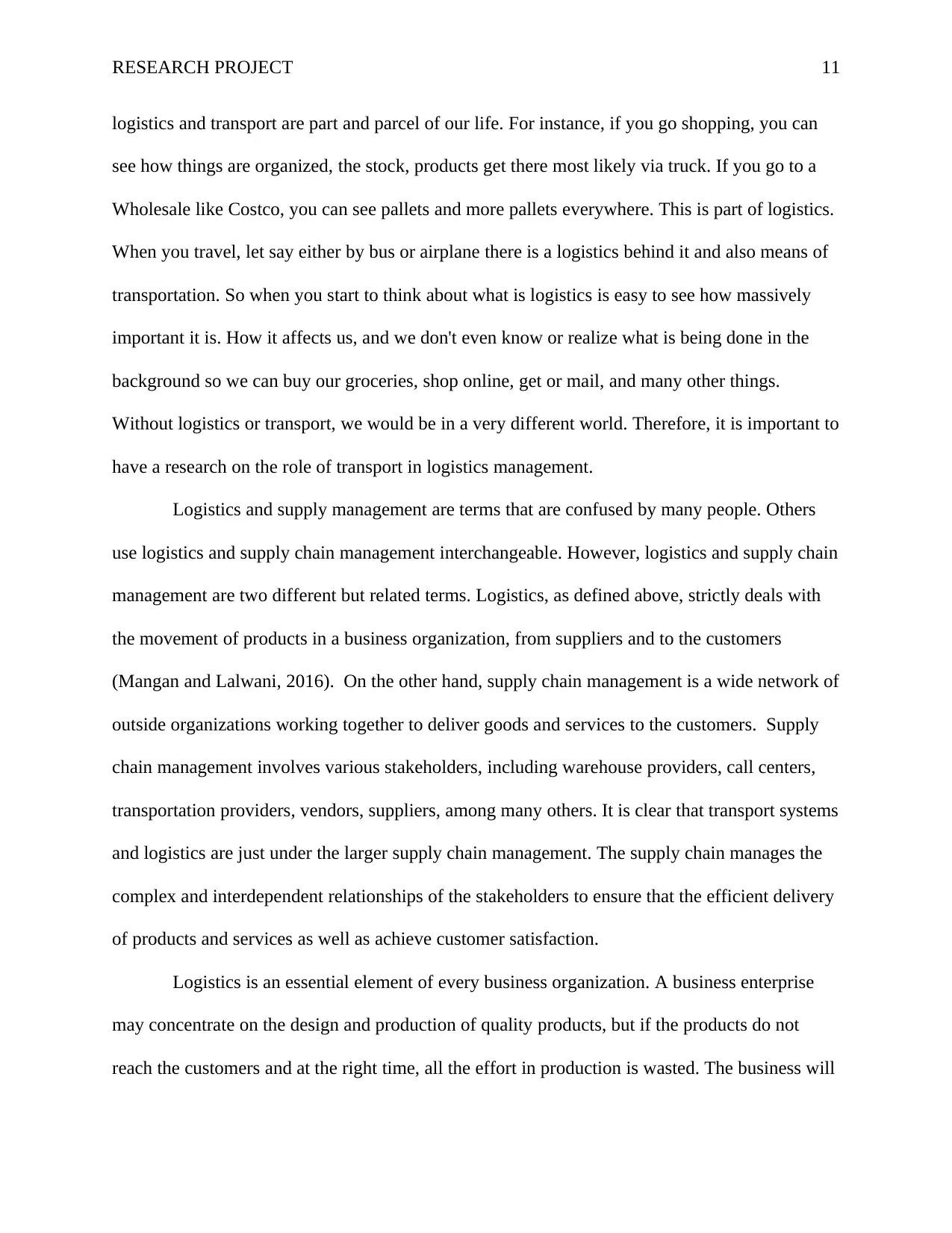
RESEARCH PROJECT 11
logistics and transport are part and parcel of our life. For instance, if you go shopping, you can
see how things are organized, the stock, products get there most likely via truck. If you go to a
Wholesale like Costco, you can see pallets and more pallets everywhere. This is part of logistics.
When you travel, let say either by bus or airplane there is a logistics behind it and also means of
transportation. So when you start to think about what is logistics is easy to see how massively
important it is. How it affects us, and we don't even know or realize what is being done in the
background so we can buy our groceries, shop online, get or mail, and many other things.
Without logistics or transport, we would be in a very different world. Therefore, it is important to
have a research on the role of transport in logistics management.
Logistics and supply management are terms that are confused by many people. Others
use logistics and supply chain management interchangeable. However, logistics and supply chain
management are two different but related terms. Logistics, as defined above, strictly deals with
the movement of products in a business organization, from suppliers and to the customers
(Mangan and Lalwani, 2016). On the other hand, supply chain management is a wide network of
outside organizations working together to deliver goods and services to the customers. Supply
chain management involves various stakeholders, including warehouse providers, call centers,
transportation providers, vendors, suppliers, among many others. It is clear that transport systems
and logistics are just under the larger supply chain management. The supply chain manages the
complex and interdependent relationships of the stakeholders to ensure that the efficient delivery
of products and services as well as achieve customer satisfaction.
Logistics is an essential element of every business organization. A business enterprise
may concentrate on the design and production of quality products, but if the products do not
reach the customers and at the right time, all the effort in production is wasted. The business will
logistics and transport are part and parcel of our life. For instance, if you go shopping, you can
see how things are organized, the stock, products get there most likely via truck. If you go to a
Wholesale like Costco, you can see pallets and more pallets everywhere. This is part of logistics.
When you travel, let say either by bus or airplane there is a logistics behind it and also means of
transportation. So when you start to think about what is logistics is easy to see how massively
important it is. How it affects us, and we don't even know or realize what is being done in the
background so we can buy our groceries, shop online, get or mail, and many other things.
Without logistics or transport, we would be in a very different world. Therefore, it is important to
have a research on the role of transport in logistics management.
Logistics and supply management are terms that are confused by many people. Others
use logistics and supply chain management interchangeable. However, logistics and supply chain
management are two different but related terms. Logistics, as defined above, strictly deals with
the movement of products in a business organization, from suppliers and to the customers
(Mangan and Lalwani, 2016). On the other hand, supply chain management is a wide network of
outside organizations working together to deliver goods and services to the customers. Supply
chain management involves various stakeholders, including warehouse providers, call centers,
transportation providers, vendors, suppliers, among many others. It is clear that transport systems
and logistics are just under the larger supply chain management. The supply chain manages the
complex and interdependent relationships of the stakeholders to ensure that the efficient delivery
of products and services as well as achieve customer satisfaction.
Logistics is an essential element of every business organization. A business enterprise
may concentrate on the design and production of quality products, but if the products do not
reach the customers and at the right time, all the effort in production is wasted. The business will
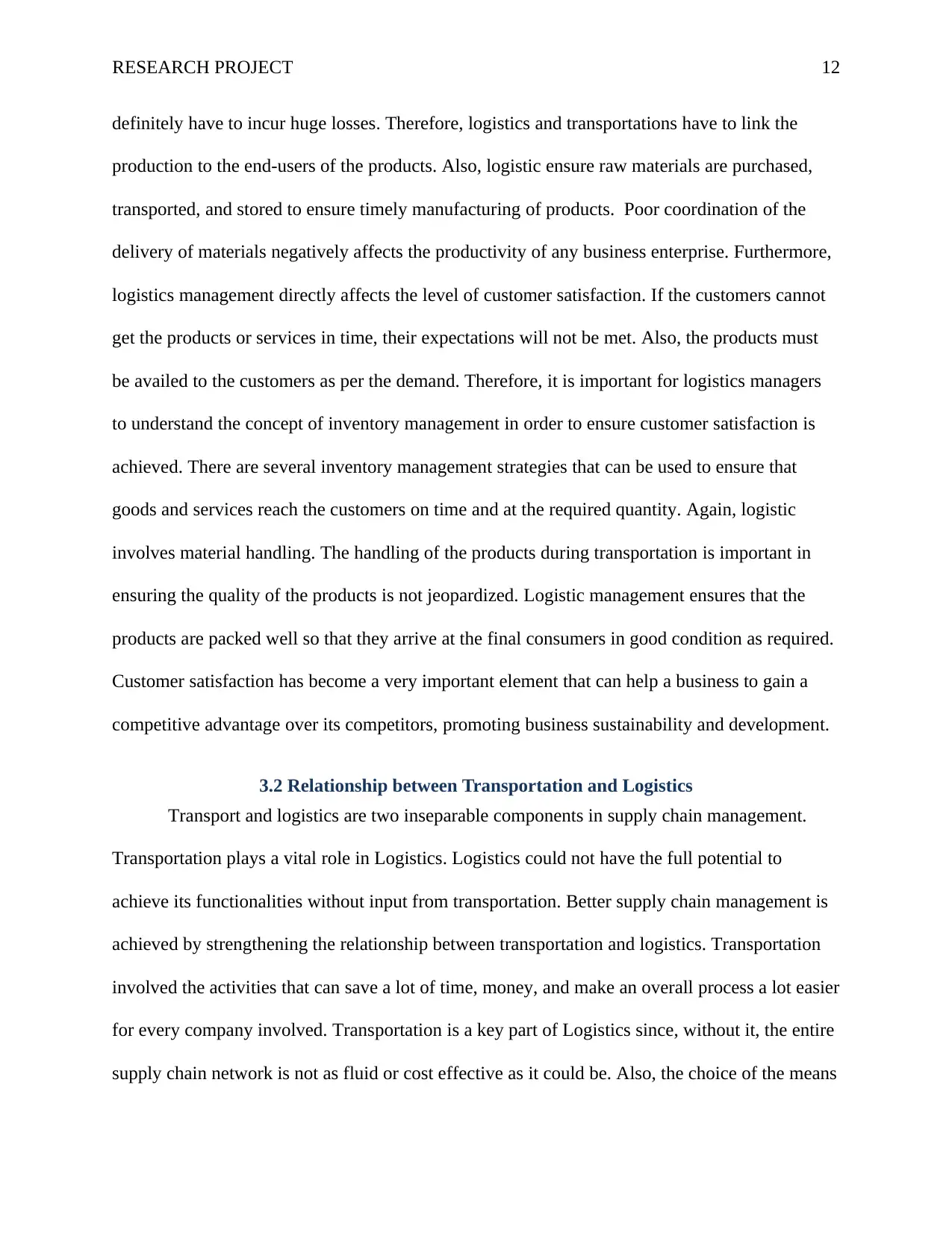
RESEARCH PROJECT 12
definitely have to incur huge losses. Therefore, logistics and transportations have to link the
production to the end-users of the products. Also, logistic ensure raw materials are purchased,
transported, and stored to ensure timely manufacturing of products. Poor coordination of the
delivery of materials negatively affects the productivity of any business enterprise. Furthermore,
logistics management directly affects the level of customer satisfaction. If the customers cannot
get the products or services in time, their expectations will not be met. Also, the products must
be availed to the customers as per the demand. Therefore, it is important for logistics managers
to understand the concept of inventory management in order to ensure customer satisfaction is
achieved. There are several inventory management strategies that can be used to ensure that
goods and services reach the customers on time and at the required quantity. Again, logistic
involves material handling. The handling of the products during transportation is important in
ensuring the quality of the products is not jeopardized. Logistic management ensures that the
products are packed well so that they arrive at the final consumers in good condition as required.
Customer satisfaction has become a very important element that can help a business to gain a
competitive advantage over its competitors, promoting business sustainability and development.
3.2 Relationship between Transportation and Logistics
Transport and logistics are two inseparable components in supply chain management.
Transportation plays a vital role in Logistics. Logistics could not have the full potential to
achieve its functionalities without input from transportation. Better supply chain management is
achieved by strengthening the relationship between transportation and logistics. Transportation
involved the activities that can save a lot of time, money, and make an overall process a lot easier
for every company involved. Transportation is a key part of Logistics since, without it, the entire
supply chain network is not as fluid or cost effective as it could be. Also, the choice of the means
definitely have to incur huge losses. Therefore, logistics and transportations have to link the
production to the end-users of the products. Also, logistic ensure raw materials are purchased,
transported, and stored to ensure timely manufacturing of products. Poor coordination of the
delivery of materials negatively affects the productivity of any business enterprise. Furthermore,
logistics management directly affects the level of customer satisfaction. If the customers cannot
get the products or services in time, their expectations will not be met. Also, the products must
be availed to the customers as per the demand. Therefore, it is important for logistics managers
to understand the concept of inventory management in order to ensure customer satisfaction is
achieved. There are several inventory management strategies that can be used to ensure that
goods and services reach the customers on time and at the required quantity. Again, logistic
involves material handling. The handling of the products during transportation is important in
ensuring the quality of the products is not jeopardized. Logistic management ensures that the
products are packed well so that they arrive at the final consumers in good condition as required.
Customer satisfaction has become a very important element that can help a business to gain a
competitive advantage over its competitors, promoting business sustainability and development.
3.2 Relationship between Transportation and Logistics
Transport and logistics are two inseparable components in supply chain management.
Transportation plays a vital role in Logistics. Logistics could not have the full potential to
achieve its functionalities without input from transportation. Better supply chain management is
achieved by strengthening the relationship between transportation and logistics. Transportation
involved the activities that can save a lot of time, money, and make an overall process a lot easier
for every company involved. Transportation is a key part of Logistics since, without it, the entire
supply chain network is not as fluid or cost effective as it could be. Also, the choice of the means
⊘ This is a preview!⊘
Do you want full access?
Subscribe today to unlock all pages.

Trusted by 1+ million students worldwide
1 out of 29
Related Documents
Your All-in-One AI-Powered Toolkit for Academic Success.
+13062052269
info@desklib.com
Available 24*7 on WhatsApp / Email
![[object Object]](/_next/static/media/star-bottom.7253800d.svg)
Unlock your academic potential
Copyright © 2020–2026 A2Z Services. All Rights Reserved. Developed and managed by ZUCOL.





